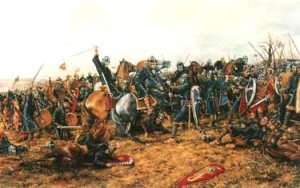The conflict between Stephen and the Scottish had simmered on for the last few years. It’s clear that King David of Scotland had little time for Stephen, and supporting Matilda’s claim to the throne was just the latest of several excuses he used to raise his banners and invade. Stephen, however, was busy dealing with Matilda, not to mention Robert of Gloucester, and he dealt with the Scottish problem through appeasement – essentially gifting the land to Prince Henry, son of King David. Needless to say, this did not go down well with the other nobles who had claims to the land, especially one Ranulf de Gernon, Earl of Chester. Ranulf’s father had at one time owned the lands of Carlisle and Cumberland, and Ranulf viewed granting them to a foreign power as a supreme insult. First he planned to ambush Prince Henry on the road and kill him, but rumours of the plot surfaced and Stephen himself, along with his guardsmen, escorted Henry safely home. Ranulf then decided instead to occupy Lincoln Castle, which he did by sending his wife’s household there to visit, then arriving himself to “escort her home”, and immediately seizing the castle.

Ranulf of Chester, from the windows of Chester Cathedral.
Photo via Find A Grave
Stephen’s initial reaction was make a pact with Ranulf and grant him the castle, but messages of ill-treatment from the civilians of the town soon forced him to return. There he was welcomed into the city and immediately besieged the castle, though Ranulf managed to escape it before it was surrounded. He immediately declared for Matilda and linked up with Robert of Gloucester to relieve the siege. The stage was set for one of the few large open battles of the war – on one side Robert and Ranulf with their men (and a sizeable contingent of Welsh allies, there in a freebooting rather than official capacity), and on the other Stephen, with his Flemish mercenaries and Breton knights, supported by the local citizenry. Unfortunately Stephen’s Norman nobles decided that the odds were strongly against them, and fled during the fighting. Stephen himself fought on, arming himself with a Danish battle axe that a local gave him after his sword broke, but he was soon overwhelmed and captured. In the eyes of many, the war was over.
Matilda, certainly, felt that this put an end to Stephen’s claim. She had him imprisoned in Bristol Castle, first under open arrest and then later in chains. Henry of Blois, Stephen’s brother, also saw this as ending the war – he made a private deal with Matilda to provide the church autonomy that Stephen had promised but never delivered. In return for this, he handed over the (somewhat depleted) royal treasury, and (as papal legate) excommunicated most of Stephen’s remaining supporters. Other churchmen (Theobald the Archbishop of Canterbury among them) were less willing to go along, but they met with Stephen who agreed to release them from their oaths of fealty. Meanwhile, Geoffrey of Anjou, Matilda’s husband, swept up most of the remaining land in Normandy with little resistance.
Not everyone was so convinced, however. Stephen’s wife, Queen Matilda, appealed directly for her husband’s release. While this was denied, it was noteworthy that few nobles outside Matilda’s immediate supporters appeared to support her pre-coronation acclamation – including, significantly, no delegation from London. Nonetheless, Matilda moved to London to hold her coronation as Queen. It was not to be, however – the populace rose in revolt a few days before the ceremony, and Matilda was forced to flee the city to Oxford.

A popular subject for drawings of the period is Queen Matilda appealing to Empress Matilda to release her husband.
This drawing comes from Peter Cassell’s Reign of Stephen
The “other” Matilda, in the meantime, came into her own. Her husband had previously used her to command forces – just the year before she had secured Dover after it revolted, preventing Empress Matilda landing forces there. Now, in his absence, she became the rallying point for his supporters, and even managed to persuade brother Henry to return to the fold. Henry then besieged the royal castle in Winchester, which Empress Matilda was using as a base. Robert of Gloucester sallied to the rescue, rescuing the Empress and besieging Henry’s forces in turn. Queen Matilda’s army cut their supply lines, however, and Robert of Gloucester and the Empress decided that they had to abandon the siege. Their orderly retreat, however, was attacked by the Queen’s army and turned into an utter rout, cutting the main Angevin forces to pieces. While Empress Matilda escaped, Robert of Gloucester was captured.

Another interpretation of the Empress hearing Queen Matilda’s plea for Stephen’s release.
Of course, this never actually happened, but it fits the Victorian ideal of wifely duty better than her raising an army.
Once again, attempts were made to settle the war peacefully, and once again the matter broke down. Instead, Robert was exchanged for King Stephen – the Empress was clearly unwilling to execute him, and it was obvious that his imprisonment had not diminished his cause. Meanwhile, however, Robert of Gloucester was vital to her side as a commander who her men would follow. Whatever her rationale, Stephen was freed, and was soon re-crowned by Henry of Blois. His health had suffered from imprisonment, but he recovered enough to journey north and persuade Ranulf of Chester to switch sides once again. With that, the war returned to a more even footing. Normandy was securely under Matilda’s control, but her foothold in England looked shakier and shakier – her stronghold at Oxford was laid under siege in 1142, and she was forced to flee across the frozen river to prevent being captured.The tide had turned once again, and it was clear to everyone that the war was far from over.




Pingback: Today’s Scribbling: The Tide Of The Anarchy Turns – Daily Scribbling